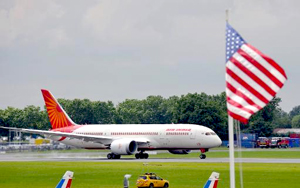 New Delhi, Feb 1: The U.S. Federal Aviation Administration has downgraded India's air safety rating over concerns about pilot training and other issues, the agency said Friday.
New Delhi, Feb 1: The U.S. Federal Aviation Administration has downgraded India's air safety rating over concerns about pilot training and other issues, the agency said Friday.
The downgrade to the lower of two safety categories means Indian airlines cannot increase the number of flights they operate to the United States or enter into any new code-sharing arrangements with American carriers, said Uday Moray, India's Civil Aviation Ministry spokesman. He said the move will not affect current flights.
India has started training programs to address the problems and should be in line with the FAA's category 1 standards by March, Moray said.
Moray said the FAA raised 33 issues, including beefing up safety training programs, offering better safety documentation and hiring full-time flight operations inspectors.
The FAA said in a statement Friday that the downgrade "signifies that India's civil aviation safety oversight regime does not currently comply with the international safety standards set by the International Civil Aviation Organization," a U.N. agency.
The U.S. will work with Indian aviation authorities "to identify remaining steps necessary to regain category 1 status," the FAA said.
India had had a category 1 status since August 1997, the agency said.
A category 2 rating means a country either lacks laws or regulations necessary to oversee air carriers in accordance with minimum international standards, or that its civil aviation authority is deficient in one or more areas, such as technical expertise, trained personnel, record-keeping or inspection procedures.
Jitender Bhargava, a civil aviation expert, said the FAA's decision is embarrassing for India but does not mean it's unsafe to fly on Indian carriers.
He said the move will hurt Indian airlines Air India and Jet Airways at a time when foreign carriers are expanding flights to India.
The move will "hit the market share of Indian carriers in our home market," he said.
ICAO conducted an audit in December 2012 that identified safety oversight deficiencies by India's Directorate General of Civil Aviation. Afterward, FAA began a "reassessment" of India's compliance with international standards, including visits by U.S. inspectors to India in September and early December and meetings this week in Delhi, the FAA statement said.
The Indian government has made "significant progress" toward addressing issues raised by FAA inspectors, the agency said. That progress includes recent government approval for hiring of 75 additional full-time aviation inspectors, FAA noted.
India is one of the fastest growing aviation markets in the world, averaging about 11 percent growth a year, according to the U.S. Trade and Development Agency.
The FAA's decision to downgrade India was made at the same time the U.S. government is making a strong push to encourage the Indian government and aviation industry to buy planes and technology from U.S. companies. The U.S. Trade and Development Agency sponsored a two-day "U.S.-India Aviation Summit" in Washington last October at which government officials, including FAA Administrator Michael Huerta and Transportation Secretary Anthony Foxx, touted U.S. technology to several dozen Indian officials.





Comments
Add new comment